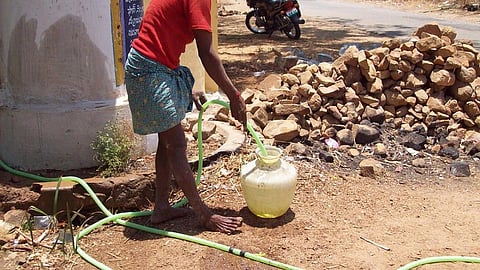
- Topics
- Feature
- Opportunities & Events
- About
- Hindi Portal
- Data
- Topics
- Feature
- Opportunities & Events
- About
- Hindi Portal
- Data

Testing drinking water gets easy thanks to JJM and ICMR
The National Jal Jeevan Mission in partnership with ICMR has launched the Water Quality Information Management System that will allow users to get the quality of drinking water tested through a network of nearly 2,000 labs across the country. The online portal will leverage the technical capacity built for Covid-19 testing and surveillance.
The government has earmarked nearly Rs 1,000 crore for testing so that it ensures the quality of drinking water supply along with the required quantity under the flagship programme that aims to provide tap water connection in every rural household by 2024. (The Times of India)
Panel recommends near-negligible eco-sensitive zone (ESZ) around Galathea national park
To give way to the development of an airport, a major transhipment port, and a strategic defence project, an expert committee of the environment ministry has recommended a near-negligible eco-sensitive zone (ESZ) around Galathea national park (GNP) in the Great Nicobar Island in the Andaman and Nicobar Islands region. The island is a biosphere reserve, besides this GNP is home to 648 species of flora and 330 species of fauna and the Shompens, particularly vulnerable tribal groups. Stressing on the need for holistic development and the island's tremendous strategic significance for the country, the committee informed that there is no scope for ESZ left. (Science the Wire)
PIL on flood management filed in 2011 gets rejected by Orissa HC
In 2011, petitions were filed for the constitution of a committee of experts on flood and reservoir management to suggest the changes required for smooth flood management in the Hirakud dam. The petitions had also sought direction for ascertaining whether the flood in that year was because of poor management of the water level of the reservoir. The Orissa High Court declined the two PILs on the grounds of limitation of the court’s power to intervene in such matters. (The New Indian Express)
Panel for studying Sarasvati river reconstituted
On the notification issued by the Archaeological Survey of India, the Centre has reconstituted an advisory committee to chalk out a plan for studying the mythical Sarasvati river for the next two years. The earlier committee, whose term ended in 2019, was set up in 2017 to define the Sarasvati river and its basin and identify “special items of geotechnical nature for the study of the Sarasvati basin and to suggest names of competent agencies/individuals”. The new panel will review the work done by the previous one and then formulate a plan and advise the Government Departments conducting research. (The Hindu)
Easing of guidelines for eco-tourism projects causes concern among experts
Last month, the environment ministry’s forest advisory committee eased norms for ecotourism projects by allowing them to build “non-permanent” structures in protected areas without permission from the central government.
As per the experts, the move could mean building of temporary structures and trails in eco-sensitive zones which will affect both wildlife and rights of forest dwellers.
As per the ministry, eco-tourism will be considered as a forestry activity. However, in the case of construction of permanent structures, it will be considered a non-forestry activity. The committee is yet to decide the definition of “non-permanent” causing concern among the experts. (Hindustan Times)
This is a roundup of important policy matters from March 1 - 15, 2021. Also, read the news this week.